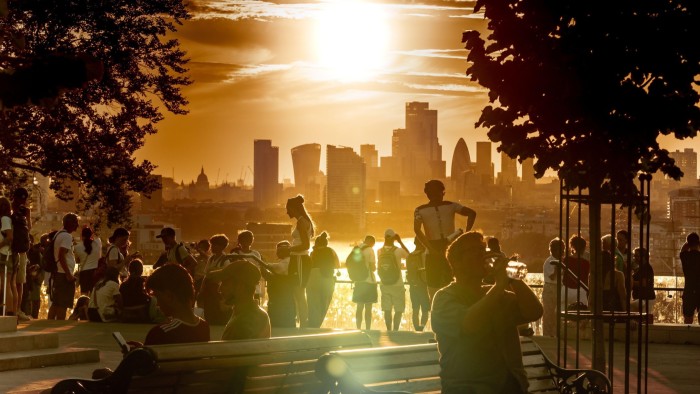Stay informed with free updates
Simply sign up to the Climate change myFT Digest — delivered directly to your inbox.
Heat-related deaths in England and Wales would rise 50-fold over the next half-century if climate change is severe and adaptations are minimal, according to research that lays bare the need to prepare for higher temperatures.
Fatalities would climb six-fold under even the most optimistic scenario as the planet warms and the population becomes more vulnerable due to ageing, says the study published in the journal PLoS on Thursday.
Back-to-back heatwaves this summer has underscored how initiatives from urban planning to the building and upgrading of homes have historically paid little heed to the threat of ever hotter summers.
“Our research shows how increases in heat-related deaths are not just a consequence of rising temperatures — they’re also driven by how we build our cities, care for vulnerable populations, and address social inequality,” said Rebecca Cole of the London School of Hygiene and Tropical Medicine and lead author of the paper.
“Concerted adaptation strategies are required, well in excess of those over the last 30 years,” she added.
The researchers forecast the impacts of 15 different scenarios. They adjusted for demographics, regional climate variations, potential power outages, and different levels of warming and adaptation including shutters and active cooling systems.
The current baseline of 634 annual heat-related deaths would soar to 10,317 in the 2050s and 34,027 in the 2070s, under a worst-case scenario. That would include 4.3C of warming above pre-industrial temperatures by the end of the century. The world is currently on course to reach 2.9C of warming by 2100 under existing government pledges.
The most optimistic scenario, including 1.6C of warming, would still drive deaths up to 3,007 per year in the 2050s and 4,592 in the 2070s, the study found.
The projections highlight how the balance of danger from heat and cold is likely to shift across Europe as the climate changes. Spring 2025 was the sunniest and warmest on record in Britain, while last month ranked as the hottest June on record in England.
British homes have generally been built and modified to protect against extreme cold, which is estimated to cause thousands of deaths each year. In the UK, millions of properties are built of brick, which absorbs heat slowly but retains it for longer than other materials.
“UK homes have traditionally been designed to retain heat, and government retrofit schemes necessarily focus on energy efficiency and insulation,” Cole said.
Construction rules that came into force in 2022 require new residential buildings to be built to mitigate the risk of overheating. Housing association tenants can speak to their council if excess heat means that their property is in a dangerous condition, the Department for Environment, Food and Rural Affairs said.
Another issue is a lack of state subsidies for one of the main types of heat pumps that can be used for cooling buildings, as well as heating.
Johann Beckford, senior policy adviser at the Green Alliance think-tank, said the government should extend its support to air-to-air heat pumps, which it looked at in a recent consultation. “These heat pumps that can cut our emissions and make our homes more comfortable during high heat events,” he said.
A separate, rapid study published this week found that there were an estimated 2,300 heat-related deaths in Europe between June 23 and July 2, including 263 in London alone.
The research warned that relatively small increases in temperatures during hot spells can trigger big surges in deaths. Many fatalities occurred in homes and hospital settings among already vulnerable people, particularly the elderly, and are often not reported, the study said.
Many deaths are caused by strain on the cardiovascular system, rather than heat directly, said Mike Tipton of the University of Portsmouth, an expert on the effects of weather conditions. This is because the human body attempts to “offload heat” by increasing blood flow to the skin and decreasing it to soft internal organs.
People with cardiovascular problems or who are chronically dehydrated could experience dizziness or feel light-headed, he said. “They might faint or fall. They’re more likely to form clots.”
The Department for Energy Security and Net Zero said: “We know that keeping homes cool in hot weather is just as important as heating them in the winter.
“That’s why we have consulted on including air-to-air heat pumps under the Boiler Upgrade Scheme, and our response will be published in due course.”
